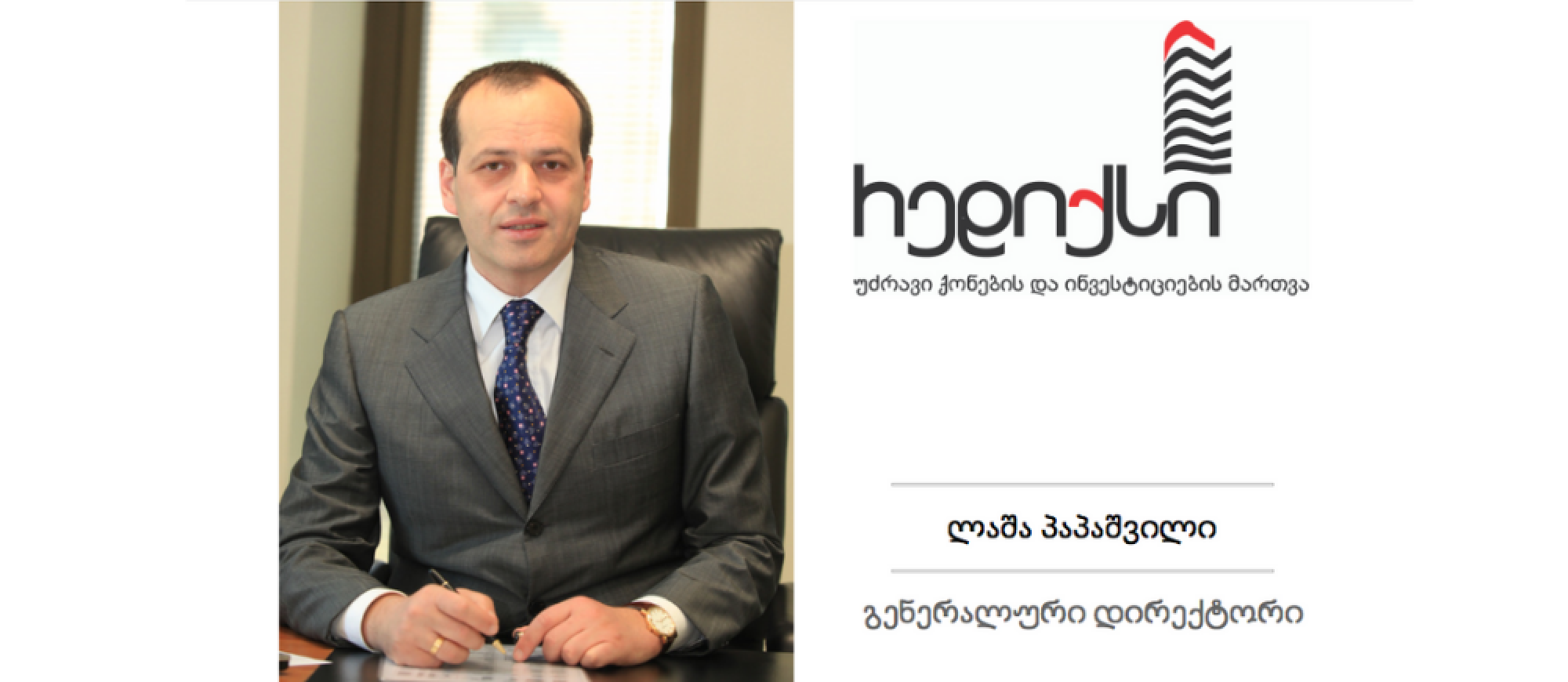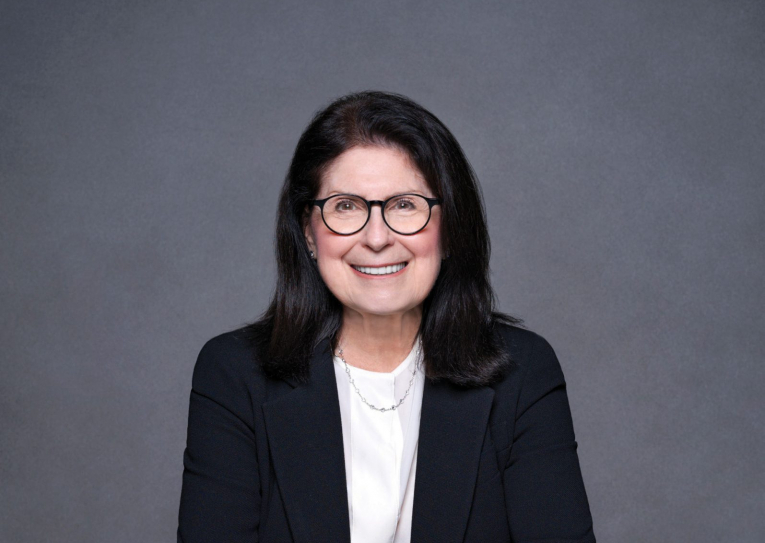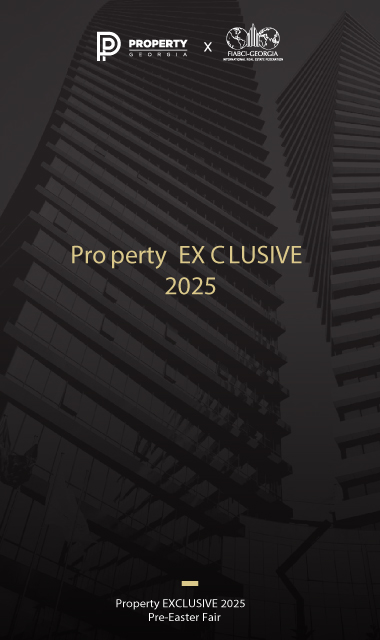Founded 10 years ago, Redix is currently building luxury residential apartments in Tbilisi. Lasha Papashvili, the founder and Chief Executive Officer of Georgia’s leading real estate development company, told Property Georgia that Redix is also involved in several new high-end and mid-scale hotel projects. Finally, the company has also distinguished itself on the office space market, with its A-class business centre on Freedom Square in Tbilisi increasing its occupancy on a daily basis.
Kate Tabatadze
- You told us in an earlier interview that one of Redix’s advantages is the company’s awareness of the ongoing processes in the real estate sector on a global level. What are the modern day trends that characterise the international real estate market today, and how does your firm adapt to them on a local level?
- Redix is currently building the most expensive residential complex in the history of independent Georgia on Chavchavadze Avenue in Tbilisi. The $70 million project is being funded by the European Bank for Reconstruction and Development (EBRD) and the Bank of Georgia. It includes residential and office properties, as well as a hotel. The 14-storey tower will be occupied by the Hilton Hotel. As for the 18-storey tower, the top 11 floors will have residential properties, while the bottom 7 floors will be taken up by offices.
Sales of residential properties are strictly limited due to quantity. There are only 11 flats spread across 11 floors, each with an area of 700 m2. The price is $6000 per m2. Interior works have not even started yet, but we have already sold 7 of the flats. Even though this is a mixed-use project, all reception points will be fully independent from each other. Each flat will have a private cinema and a built-in wine room with a temperature and humidity control system. I would like to emphasise that we use only premium-quality materials for all interior works. These same properties would cost three times more in London or Paris.
Redix Apartments on Chavchavadze Avenue reflect latest trends from global megalopolises right here in Tbilisi. The residential part of the complex will be completed in the first half of 2019, while the 4-star Hilton Garden Inn hotel will open by the end of 2018.
With regards to the hotel itself, we are introducing the world’s leading brand onto the market in Tbilisi, where it has not been represented thus far. Hilton Garden Inn represents the same segment as the Holiday Inn and Courtyard by Marriott, and will be competing with those brands. One of the project’s main values lies in its location. With the exception of the five-star Pullman hotel, which is to be opened across the road from us, Hilton Garden Inn will have no competitors within a radius of 2 to 3 kilometres.
- You are planning to introduce another international hotel brand onto the local market as part of the $35 million project on Freedom Square. Can you tell us which brand is behind your plans?
- At this stage, we are developing the concept for a 140-room high-end (four or five star) hotel on Freedom Square, which will operate in the same segment as Radisson, Marriott and Hyatt. Construction is due to begin towards the end of 2018. Therefore, further information regarding the details of the project will be publicised later.
- At the end of last year, you opened the A-class business centre ‘1 Tabidze Street’ in central Tbilisi, where the largest international provider of flexible workplaces opened its branch office recently. Can Redix claim to have brought about a turning point on the Georgian office market through this high-end business centre?
- With regards to office-type properties, the Georgian market is lagging quite far behind the international standards, and this does not apply to A-class business centres alone. Georgia does not have an established market with a regulator, and everything happens spontaneously. At 1 Tabidze Street, despite being surrounded by residential buildings, we have managed to meet all the required standards, such as having a dual power source, top-quality heating, air conditioning and ventilation systems, as well as isolation systems. All of this is part of our ‘knowhow’ in this country. The existing norms do not require us to apply European standards to all of our development projects, but that is what we aim to do.
Regus – a large office space service company – has already opened its branch inside the Tabidze Street business centre. There are rather few firms like Regus in the world. Today it owns 3000 offices around the globe, and continues to grow rapidly. Their network expanded by 1000 new offices during the last two years alone, as we were negotiating with them.
- You also have big plans regarding hotels in resort areas of Georgia. More specifically, construction of a 140-room hotel is currently ongoing in Abastumani. Will it also house an international hotel brand, and how will the town of Abastumani be affected by the $32 million project?
- For our first boutique hotel Kabadoni, we picked a so-called soft brand – Preferred Hotel Group, whom we do not manage, and it is not a franchise contract, either – we are only involved in the joint marketing and sales scheme. The group operates 700 hotels worldwide, and controls its standards very strictly. We are likely to choose a ‘soft brand’ strategy for our Abastumani hotel, too. We develop property that is adaptable to brands of any category, be it Hilton, Accor or Radisson. However, we do not rule out once again choosing Preferred Hotel Group and Georgian management. Developing a 140-room hotel in Abastumani means getting the whole region involved. If we look at statistics, Abastumani would contribute 2000 to 2500 beds to the market during the busiest period, while all of Adigeni and Akhaltsikhe would work on supplying them. Construction of the hotel has begun, with earthworks having already been completed, and construction of the main building commencing during the summer. By implementing the Abastumani project, Redix has created new jobs for the whole Samtskhe-Javakheti region.
- Redix has another hotel in an exotic resort, in the form of Samzeo in Tusheti. How successful is it, and do you have any plans in a similar direction?
- Through joint assistance from the World Bank and the Municipal Development Fund, $1.3 million has already been allocated for the provision of water supply for the Tusheti project. Construction of the 60-room hotel has been completed, and interior works are currently ongoing. Unfortunately, due to natural conditions, the period of work is limited in time. Landslides and mudslides are frequent, with both the hotel owners and the local population suffering enormously. Developing the hotel sector in Tusheti requires fairer property taxes. A hotel that operates for 3 months in a calendar year should not be paying taxes the full 12 months. We are currently negotiating with the government in this regard. Tusheti is a relatively new discovery for tourists visiting Georgia, and without developing places such as these, the government will find it difficult to meet its targets regarding tourism.
Redix is once again planning new things. We now have Telavi in our sights. The Kabadoni hotel in Sighnaghi is unable to accommodate large tourist groups, as there are only 21 rooms. Construction of a 120-room hotel in Telavi will represent another big step forward for the local tourist industry. The main building of the Convergen project is virtually finished. In this case, we purchased a readily built frame of the building, which we proceeded to renovate. We would like to open the 120-room hotel in Telavi in time for the 2018 wine harvest in the autumn.
- What advice would you give to the government and individuals involved in the construction sector in order to make the Georgian real estate market more attractive for investors?
- Foreign investors currently have no interest in the Georgian real estate market. This is unlikely to change, unless the government undertakes proactive steps to improve the situation. When I started this business 20 years ago, I invited well-known foreign architects to Tbilisi. Amongst other things, they asked for an analysis of the Mtkvari river. According to them, the degree to which the city’s main river is polluted constitutes an important factor determining real estate prices. At the time, it was difficult for me to imagine how such things could be factored in. However, now I see how many obstacles the state has to overcome, and how much research it must conduct.
The Georgian market requires quick decisions. The Council of Architects must be afforded more powers, and it must be composed of both local and foreign specialists. We must invite professionals with a broad vision of the construction sector, who think about how each individual project affects the bigger picture.




